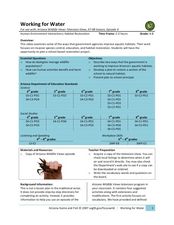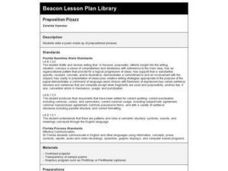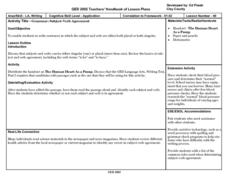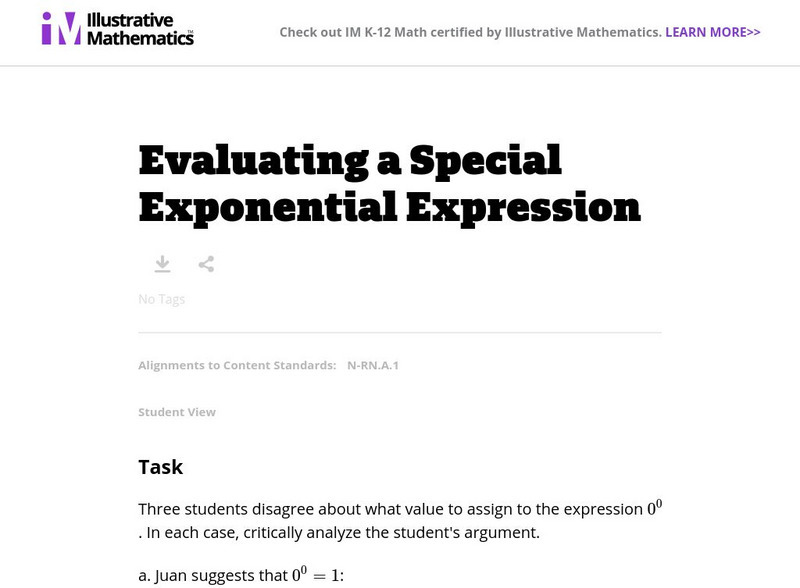Curated OER
Magnetic Discovery Bottle
Young scholars examine how to conduct simple investigations and use simple equipment to gather data. In this magnet lesson students decide what types of objects are attracted to magnets.
Curated OER
Working for Water
Students examine the ways that government works to help improve aquatic habitats. In this water habitats lesson plan students view a video and plan a school restoration project.
Curated OER
Preposition Pizazz
Students examine examples of poems and identify the prepositions in them. They write original poems using prepositional phrases and create illustrations to go with them.
Curated OER
Grammar- Subject-Verb Agreement
Students practice writing sentences in which the subject and verbs are either both singular or plural. They complete worksheets including one highlighting "The 5-Step Subject- Verb Edit Process.
Curated OER
Grammar: Subject-Verb Agreement
Students analyze English by completing a handout regarding grammar rules. In this verb lesson, students identify what a verb does, where to use it in a sentence and what a verb fragment is. Students complete a worksheet based on subject...
Curated OER
Where Have All the Endangered Gone?
Students explore animals that are endangered. They choose an endangered animal that they would like to keep from becoming extinct. Students create a persuasive presentation to persuade someone to understand why they feel keeping their...
Curated OER
Electricity/Magnetism
Second graders experiment with ballons to see which objects will cling and which objects will not. They use an assortment of objects, paper clips, pennies, button, scraps of paper, or puffed cereal. They make predictions and record results.
Curated OER
Garden For Life
Young scholars are read a story about a girl their age helping others. They discover they can have a positive impact on others. They decide on a project related to literature that benefits the school or community.
Curated OER
Comparing Chinese And Japanese Ceramics
Students discuss the conception of beauty by considering and contrasting the
appearance and use of Chinese and Japanese ceramics in this activity for the middle or high school classroom.
Common Sense Media
Common Sense Media: Education: Lesson: Device Free Moments
[Free Registration/Login Required] In this lesson, 2nd graders learn when it's appropriate to use technology and when it's not, and practice making family rules for device-free time at home. Includes lesson plan, slideshow, student...
OpenStax
Open Stax: Common Sense: From Monarchy to an American Republic
After reading this section from a chapter on "Creating Republican Governments," students will be able to compare and contrast monarchy and republican government and describe the tenets of republicanism.
Common Sense Media
Common Sense Media: Education: Going Places Safely: K 2
Students learn that they can go to exciting places online, but they need to follow certain rules to remain safe. By taking a virtual field trip, students experience the power of the Internet to take them to places they might not be able...
Common Sense Media
Common Sense Media: Education: Keep It Private (K 2nd Grade)
This lesson plan for young students will teach them the basics of staying safe online. Students review what information is private and should not be shared without a trusted adult's permission. Students then view sites that ask them to...
Common Sense Media
Common Sense Media: Education: Lesson: We the Digital Citizens
[Free Registration/Login Required] In this lesson, 2nd graders explore the amazing possibilities that come with using technology. They'll also learn from the Digital Citizens, who take a pledge to be safe, responsible, and respectful...
Common Sense Media
Common Sense Media: Education: Lesson: Pause and Think
[Free Registration/Login Required] In this lesson, the Digital Citizens teach students how to be safe, responsible, and respectful online. Includes slideshow, video, lesson plan, song and lyrics, poster, coloring book, and resources for...
Common Sense Media
Common Sense Media: Education: Privacy Rules: Grades 3 5
Learners learn that children's websites must protect their private information. They learn to identify these secure sites by looking for their privacy policies and privacy seals of approval. They discuss a scenario in which their private...
Common Sense Media
Common Sense Media: Education: Lesson Plan: Powerful Passwords
Students learn the benefits of using passwords and then play a board game to discover some strategies for creating and keeping secure passwords. Requires free membership.
iCivics
I Civics: Colonial Influences
Where did the American colonists get their ideas that lead to a revolution and a whole new kind of government? This lesson explores the Magna Carta, Mayflower Compact, English Bill of Rights, Cato's Letters, and Common Sense.
Common Sense Media
Common Sense Media: Cyber Smart! Student Curriculum Lesson: Can You Hack It? [Pdf]
Learners learn that computers and electronic files are property and explore the reasons for, consequences, and ethics of teen hacking. This ISTE-aligned lesson plan for Grades 6-8 includes student activity and Home Connection sheets....
Sophia Learning
Sophia: Comma Sense
Notes, a PowerPoint presentation, and a video introducing commas, their purpose, and common usage mistakes. Comma rules and examples concerning coordinating clauses, items in a list, introductory elements, and nouns of direct address are...
Steven Kreis, PhD
The History Guide: Thomas Paine, 1737 1809
An in-depth profile of Thomas Paine and discussion of his literary works. Includes links to e-texts of his writings.
Other
Consumer Product Safety Commission: Fireworks Information Center
Find an infographic showing firworks injuries, data about injuries by types of fireworks, age, and gender of user. Safety tips about using fireworks give good, common sense recommendations aobut the use of fireworks.
Illustrative Mathematics
Illustrative Mathematics: N rn.a.1: Evaluating a Special Exponential Expression
The purpose of this task is to study the rules of exponents in the context of trying to make sense of a challenging mathematical expression. Teachers will critically analyze each student's argument. Aligns with N-RN.A.1.
















